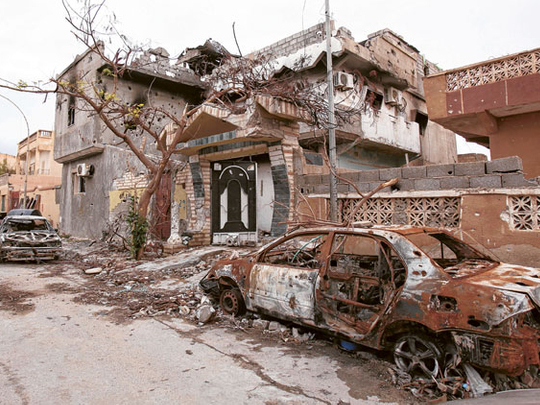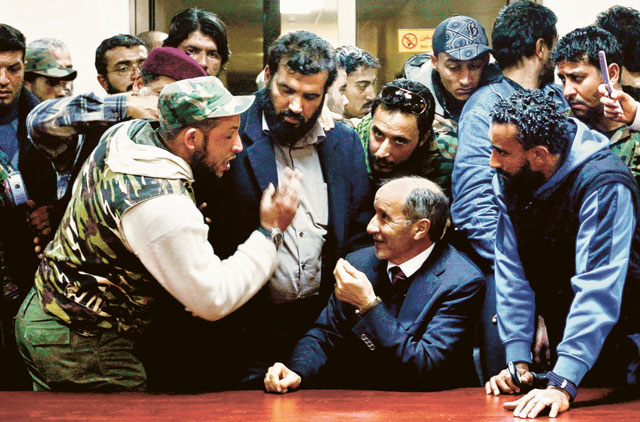
Sirte, Libya: Sirte was a city protected, even pampered, by the regime of Muammar Gaddafi. But now, the fallen leader's forgotten hometown is simmering with anger at being sidelined in a ‘new' Libya.
It was in Sirte, 360km east of Tripoli, that the ‘King of Africa' sought refuge in August after rebels overwhelmed the capital.
And while loyalists fought fiercely to protect Sirte and their leader, two months later rebels found and killed Gaddafi in the very city where he was born.
In one neighbourhood numbered ‘2', where the bloodiest battles raged between rebels and Gaddafi loyalists, resentment is festering.
Protest unnoticedEarlier this month a protest there against the ‘marginalisation' of Sirte went largely unnoticed across the nation.
"National unity cannot be achieved without compensation for damages, no exceptions. No to the marginalisation of Sirte," read one banner.
"Where is reconstruction? No officials, no media," lamented another.
Sirte has paid dearly for offering sanctuary to Gaddafi. Streets on end have been reduced to rubble, buildings gutted by shelling and are waiting to be razed.
Piles of garbage cover the streets of the city that once hosted meetings of top-tier international officials.
Widespread damage
"No one has come to see about us," said Ebrahim Hreir, a university student.
"There were war crimes here too, but as it's Gaddafi's turf nobody cares."
Ebrahim Abdullah fled Sirte on October 18 and returned only a few days ago, to find that his flat had been ransacked by the "thuwar", or revolutionaries.
"Everything is gone: our furniture, my wife's gold jewellery, my savings," Abdullah told AFP.
"I think I will leave this city. Where? I don't know. God's world is vast," said the stone-faced man.
Like many other residents, Abdullah firmly believes that Sirte is being "punished" for its loyalty to Gaddafi. "The situation is very difficult," said Ahmad Korbaj, who heads a local council tasked with assessing damage done to the city. "There is no government action."
Korbaj estimates that between 40 per cent and 60 per cent of those who fled the fighting in Sirte have not yet returned due to the lack of reconstruction.
Today, a few months after the battles ended, some homes still have no running water and owners were left to their own means to figure out how to restore power. Worse still, Korbaj fears there may still be unexploded munitions in the rubble.
No love lost
"The city is suffering," Abdul Hafiz Ghoga, vice-chairman of the National Transitional Council, said as he announced that the NTC was sending a delegation to "assess the situation and determine the needs" of Sirte.
Libya's new governing bodies have said post-war national reconciliation is one of their top priorities. But in Sirte, this will likely prove no easy task.
"What kind of reconciliation is it if they do not accept the opinions of others," asked Sirte resident Masoud Abdul Hamid.
"We have no desire for their reconciliation. They are liars," added another resident, who requested anonymity.
"They have wrought destruction and death. May God never forgive them."
Many in this defeated city remain faithful to the memory of Gaddafi, a figure deplored by the majority of the Libyan population. A popular slogan of supporters of the former regime still echoes here: "Allah, Muammar, Libya, that's all!"
And before they agree to any potential reconciliation between Gaddafi's adversaries and loyalists, many in Sirte have one non-negotiable demand.
"The first condition for reconciliation is that the location of our leader's tomb be disclosed," said Tuhami Hafez, referring to the fact that Gaddafi had been buried secretly in the desert.
"It is our right to know," he said vehemently, as dozens of men standing around nodded enthusiastically.
But demands like this continue to fuel resentment among Libyans in other cities. "They deserve what happened to them; it'll teach them a lesson," said one Tripoli resident passing through Sirte.
"Maybe they'll get a little taste of what the rest of Libya had to endure."













